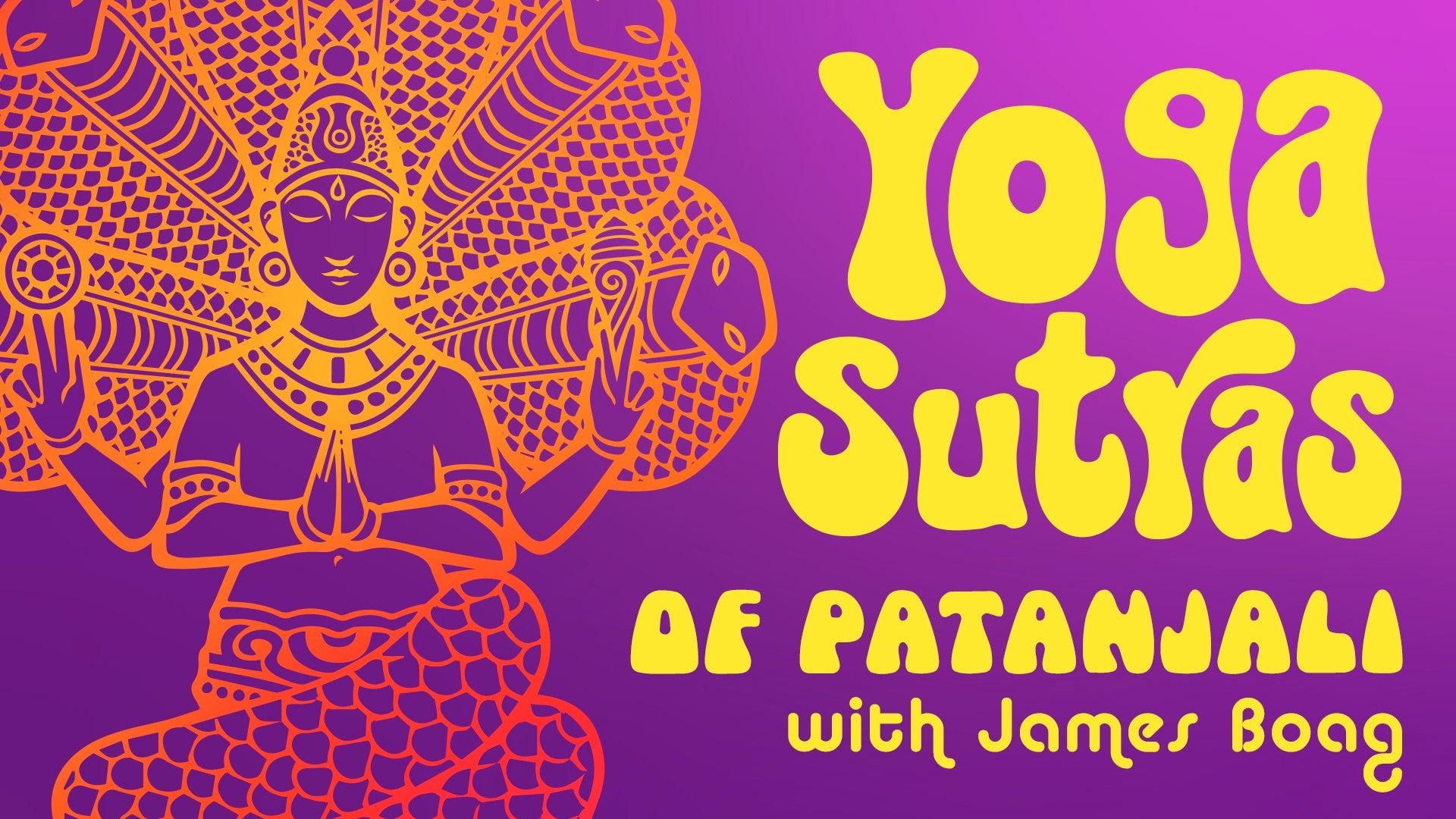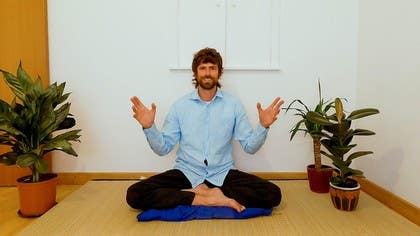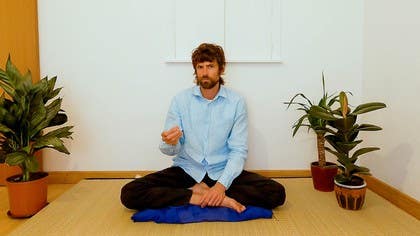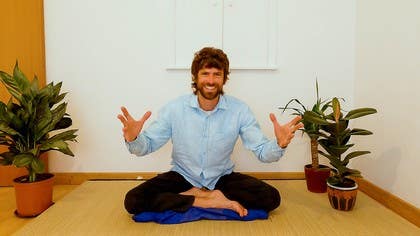Description
About This Video
Transcript
Read Full Transcript
Sutra 23, sva svaamishaktyo svaarupo palabdihitu sanyogaha. So we've heard that the manifest world continues for those who are not realized. In this next sutra, we find again this word sanyogaha, which means that very strong conjunction between the seer and the seen. So as long as we are identified with change and limitation, we're going to keep experiencing the world in some way or another. Here Patanakti talks about why it is... what is the point of this sanyogaha?
What does that enable? What does that allow? And the idea, the sanyogaha, that very strong conjunction, svaamishaktyo, of the two powers of owning and being owned, these are the... this svaamishaktyo is the hetuhu, is the reason for the upa labdhi, the coming to apprehend, to comprehend, to understand, svaarupa, one's essential reality. So encoded in this sutra is the idea that when we do get identified with change and limitation, this state, this situation, is the thing that enables us to learn and to come to the state of mastery. So there's the idea here that when we come to true knowledge, to vidya as opposed to avidya, when we see clearly, then we will be able to become separated from that partial knowledge which is chaining us to pain and suffering. Knowledge, that true clear insight, is going to basically remove the unnecessary pain, the pain that is to be avoided.
Okay, very good. So it's the idea that knowledge is also going to be a cause of separation. It's going to separate this conjunction, this sanyoga, when we see clearly, it's not going to be so tightly woven, it's just going to be in that nice balanced connected state. So it's going to disconnect us from that overly strong identification with partiality and limitation. And there's the idea that that partiality and limitation, this is the jigsaw puzzle, this is the fun of the game, extricating ourselves from all that, that is actually the platform for empowerment, that is the platform to come to mastery.
If it wasn't a challenge, then we would never actually come to that conscious mastery. So practically speaking, what to do with this, what does this mean? So there's a couple of things I think are really important, this sutra is pointing out. So one of them is interesting, the language. With Patanjali, the language is always very significant.
He's considered one of the greatest linguistic masters in Sanskrit. He distills things so so majestically, and yet the word choices are so often pregnant with so many layers of meaning and so much rich suggestion. So here Patanjali uses for the first time, sva and sfami. So he's been speaking about the seer and the scene, but now he talks about this idea of sva sfami. Now sva is the self, svaamin means one who is basically a master of the self, one who has come to own their self, to really take full ownership, responsibility, conscious awareness for the whole of their true self.
In the Indian tradition, a great master is sometimes called a swami. So my teachers teach a swami laksmanju, maybe you've heard of swami viveka nanda. It means a person who was, to a very significant degree, a realized master. They have come to recognize that underlying conscious essence. Patanjali is saying here, sva sfami saktyo svarupa labdihitu san yoga ha.
So the san yoga ha, this misidentification with the things that come and go, is being laid out here as the actual means, the cause for us coming to mastery. So one idea that I think is very explicitly encoded here is life is the teacher, life is the guru, nature is the guru. Sometimes some people say, oh, you want to do yoga, you need a guru. Don't go messing around with yoga unless you have a guru to guide you. So what does that mean?
We just kind of twiddle our thumbs and stay bound in suffering and lamentation until the guru shows up and tells us what to do. I don't think so. That is so antithetical to the empowering message of yoga. Maybe you've heard that story. If you know the person who was praying to God, the flood was coming, the waters were rising and the person prayed, oh God, please come and save me from the flood.
And the neighbors came by in their four-wheel drive with the big wheels. Like the tractor, let's say they came by in the tractor, the neighbors who have the farm down the road. Hey, we've still got space in our trailer. Do you want to come? Oh, no, no, thank you, you're praying to God.
And then the rich neighbors from way down the road, they come by in their boat and they say, hey, you need help, there's space in our boat, and you say, oh, no, no, no, because you're waiting for God to come. Now the waters have risen, you had to climb onto the roof of your house because the waters are rising so high, then a helicopter comes by, hey, you down there, can we go and pick you up? No, no, no, you're waiting for God. And then God comes in the form of Maha-kala, the Lord of time, Shiva is the Lord of time, because you've drowned. And so you see God and you say, why didn't you come and save me?
I've been devoted all my life, and what does God say? I sent the neighbors with the pickup truck, I sent the next neighbor with the boat, I sent a helicopter, and what did you do? You shunned it, you turned away from it. Life is full of divine grace. Life is the teacher, life is the guru, and yoga emphasizes this again and again.
Some people may have that great blessing of having a God realized, fully realized master as their personal close intimate relationship guru, good for them. But this is relatively rare, but yoga is for anybody who is interested in it. Anybody who is interested in really making the most of this amazing gift of a human birth, the yoga principles, the yoga teachings are so helpful for us, and one of the most foundational principles in yoga is, you are the sovereign of your life. Here Patanjata is telling us, when we practice yoga, we can move towards that state of swamihud, we can become the master of our own existence, our own life, our own consciousness, and ultimately it is up to us. Now what is the guru really?
One of the ways that the guru is defined in the Guru Gita, this beautiful 182 verse in the Skanda Purana, in which Shiva is teaching Paravati about the principle of the guru, he says, the guru is nothing other than the awakened conscience. So if one meets a real guru, a bona fide guru who is a fully realized master, there's a good chance that he or she, they don't want to see you again, because they've got plenty of people asking them for help, all they want to do is switch you on to your own conscience, because ultimately we have to walk the path ourselves, it's your soul, it's your body, it's your life, it's your way, your yogic journey. Sometimes I say, you know, in yoga, there's only one way, it's a very, very broad inclusive way, but the way to yoga is your unique individual way that works with those very robust, broad inclusive principles, but we have to walk the way ourselves. And here, potentially as saying, yoga is about coming to self-mastery, claiming responsibility. It's a self-determined path.
Of course we can help each other, satsang is one of the things that's praised to the skies in the yoga tradition, it's so good to be associated with other people who can encourage us, like I mentioned Satish Kumar in the previous sutra. If you get a chance to listen to that interview, Satish Kumar and Russell Brand, for example, you'll see how inspiring Satish Kumar is, he's 84 years old and he's been walking that path of trying to make the world, dedicating his energy every day to make the world a little bit more beautiful for 18 to 84, how many years is that, a long time, and he's so inspiring. And so, you know, if you listen to that, it lifts you up. So satsang is tremendously helpful, but then it's what we do with that. So we have to claim responsibility.
It's up to us. So it's up to us. So what does that mean? Let's, if we want to be a master, one thing that distinguishes a master is their efficiency. They make it look easy.
Minimum input, maximum output, minimum effort, maximum result. That idea I mentioned earlier, if you want to make a new habit, you've got to repeat it so many times, unless you're doing it in a playful way. If it's in a playful way, just 10 to 20 repetitions can make all the difference. So if it's up to me, it's up to me, I don't have a lot of time. This life is very short and very precious.
So can I use my opportunity as skillfully as I possibly can? Life is the guru. Life is constantly going to give me opportunities to learn, to grow. I remember one time, the first time I actually went to teach in the United States, the friend who I stayed with for a significant portion of that visit on his fridge in his house, it said, there are no mistakes, only lessons in love. It's a beautiful quote, but that idea, if we are walking a sincere path to self-mastery, we will stumble, we will fall, we will make what feel like mistakes.
But the idea, yoga is about balance, like learning to walk. How many times did we fall? So many times. Stumbling is to be expected. Our challenge is to avoid repeatedly stumbling in the same way.
But to learn like a child learns, free from the burden or the inhibition of having to get it perfectly right this time. But instead, being humble enough and realistic enough and pragmatic enough to recognize, okay, never mind perfection, let me just keep doing that little bit I can to make this world more beautiful. Let me keep doing that little bit I can to get to know myself that little bit more deeply, that little bit more thoroughly. So day in, day out, mastery, people talk about the 10,000 hours rule, you have to do something for at least 10,000 hours before you're going to become a real master. The basic idea in yoga is constancy.
So we will, here we are in this world of change, and the very bodily vehicle and all the instrumental powers we experience, they're made of the changing stuff of nature. It's not that we're just going to all of a sudden become enlightened. Probably not. Maybe one day that will happen. But along the way, let's just stay steady.
In order to stay steady, in order to become a master, it's really helpful to maintain that lightness, that playfulness. Then that hard work becomes that much easier, that much more agreeable. And when things are agreeable and playful, we can actually expedite our learning. So potentially, as well as being a great yogic master, as well as being a master linguist, he's also a master psychologist and a master pedagogue, notice his teaching style. Potentially, one thing that I really like and I will comment on more in a few sutras time is potentially avoids negative instructions.
He avoids don'ts. Instead, it's all about empowering us. And here, the language of this sutra is making clear. The field of bondage in which we experience this sun yoga, this strong conjunction with something that isn't really the whole full picture, this is actually the opportunity to come to self mastery. You human being, you have this opportunity.
So let's do all we can to practically take it and work with it skillfully.







You need to be a subscriber to post a comment.
Please Log In or Create an Account to start your free trial.